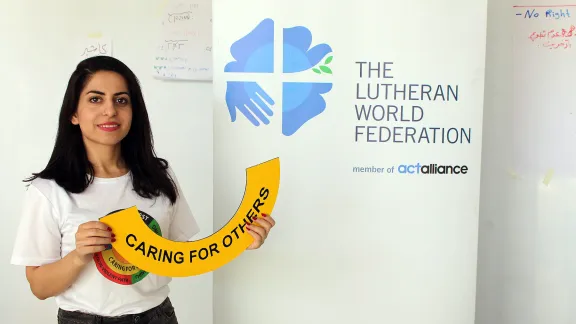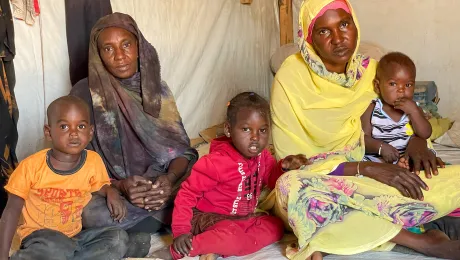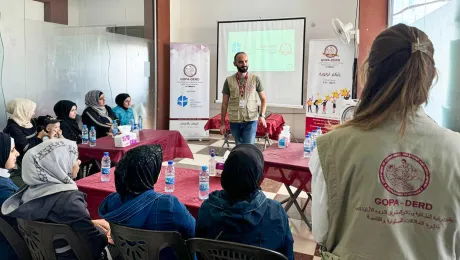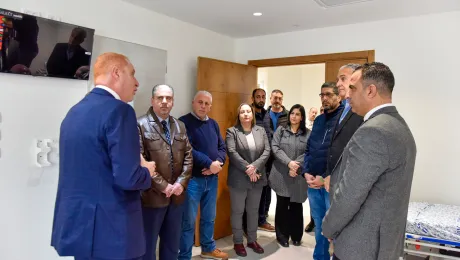
Zhiyan Abdullad during the AVP training in November 2019. Photo: LWF/ R. Omar
LWF project for peace and social cohesion in refugee and host communities
(LWI) - Peace in a post-conflict region is hard to achieve – even on a very personal level. Trauma, past hurts often in the immediate neighborhood, and challenges in everyday life often carry stress levels which easily perpetuate a cycle of violence.
This is the experience of Zhiyan Abdullah, a college student from Duhok, northern Iraq. Her community, ethnically diverse itself, has hosted tens of thousands of refugees who fled terror from the so-called Islamic State for the past years.
The young woman is one of the successful participants of the LWF Alternatives to Violence Project (AVP). The project consists of three workshops on non-violent resolution of conflict through the transformation of power relationships.
The methodology comes from the US. It was invented in a prison in the USA in 1975 at the request of the inmates. Since then, the project has expanded to over 22 countries including Rwanda, Bosnia, Sudan, Hong Kong and now Iraq. LWF introduced the project as a method for peacebuilding and social cohesion in Duhok and Ninewa governorates, facilitating several workshops of the project frame from March 2019 to December 2019.
Beyond physical violence
“I thought it would just be a theoretical workshop, but it was different in all aspects – and very practical.” Abdullah says, admitting that her friends initially had to convince her to participate. The young woman was so happy about the workshop that she not only signed up for an advanced course afterwards, but also for the third module, which trains participants as facilitators. “Those sessions have inspired me to become a more patient and non-violent person”, Abdullah says.
The AVP definition of violence and conflict includes not just war, fighting and physical abuse, but also verbal aggression, poverty, racism and sexism, loss of personal rights, and much more. AVP addresses trauma inflicted by poor decision making, through taking advantage of people and by contributing to dividing factors in the community.
“AVP is a deeply personal and experiential program that encourages participants to explore and express how they engage in violence and non-violence, personally and socially,” says Rizgar Omar, LWF Peacebuilding and Social Cohesion Officer in Iraq. “AVP workshops create a learning environment where participants understand and begin to change their relationship to conflict and therefore to other people.”
Main reason for acceptance
Zhiyan Abdullah already sees the benefits of the training in her daily life: “Now I know how to deal with conflicts without just reacting immediately and impulsively. I've also learned to work together with different types of personalities.”
Now I know how to deal with conflicts without just reacting immediately and impulsively. I've also learned to work together with different types of personalities.
According to Abdullah, the community really needs those workshops. In Dohuk, where people of different ethnic and religious background live together, family disputes are not uncommon. In addition, the community has welcomed refugees and internally displaced people from Sinjar, Mosul and Syria over the past five years, which has created tension in the host community.
“Sooner or later I think that AVP will have its own place, love and respect among the people within the community.” She strongly believes that “one day it will become a means to create acceptance within the community.”
LWF supported 7 workshops with refugees, internally displaced people, returnees and hosts from Dohuk and Ninewa governorates. At the end of the project, 27 new facilitators like Zhiyan stand ready to continue the work in their communities. They already conducted “cascade trainings” (a training combining the first two sessions of the original training) for 291 people in their home communities.
The AVP project was realized in collaboration between LWF and both local and international NGOs: Baghdad Women Association (BWA), Humanity, Christian Aid Program in Iraqi-Nohedra (CAPNI), Al - Yawm Al - Jadeed Organization for Development and Reconstruction (YJDR), Yazda, and Youth Speak.


